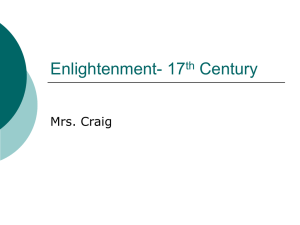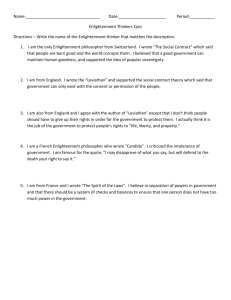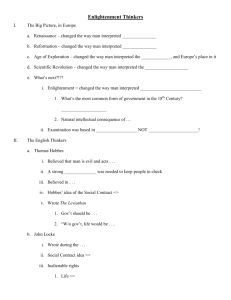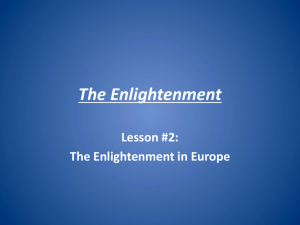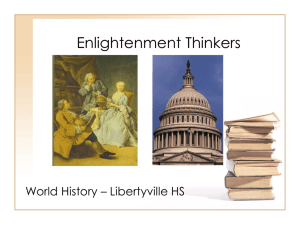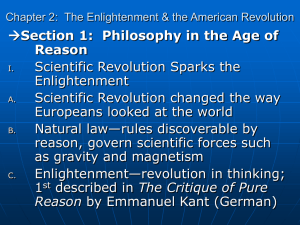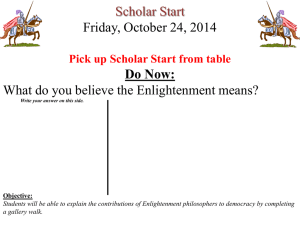Chapter 20 sect 4 Enlightenment Philosophes
advertisement
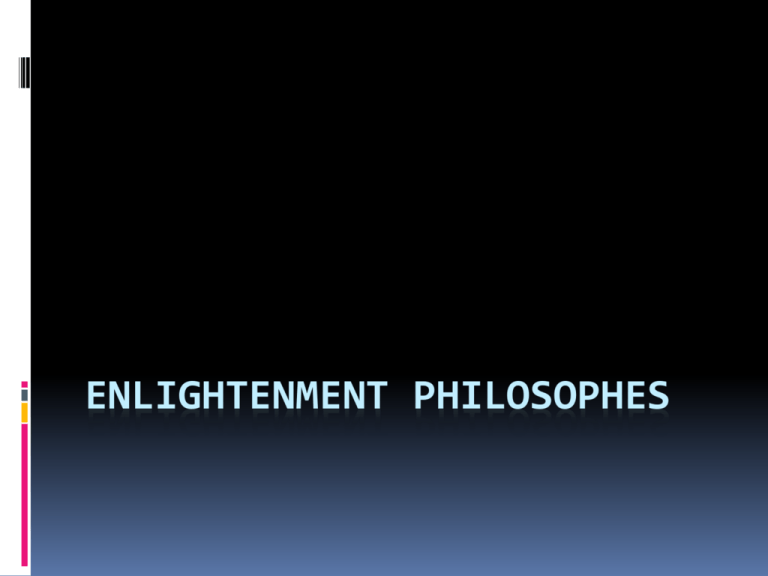
ENLIGHTENMENT PHILOSOPHES Thomas Hobbes Political philosopher English In the natural world only the strong survive, unless order is created by a great and powerful ruler Thomas Hobbes Wrote Leviathan in 1651 In the beginning there was anarchy to stop violence and danger people chose a leader to rule them and created a social contract. The Social Contract was based on the exchange of individual liberty for group safety and social order. John Locke Political philosopher English Accepted the idea of a social contract, but believed that people had only given up some of their individual rights. People should keep the right to live, enjoy liberty, and to own property. Rulers should protect those rights. A ruler who violated those rights, had broken the social contract. John Locke cont. He wrote Two Treatises of Government He argued that individual rights were superior to laws and governments. Governments existed to protect those rights. No ruler should have absolute power. A ruler who denied people their fundamental rights was a tyrant and could be overthrown by the people Enlightenment 1700’s The belief that truth can be determined solely by logical thinking was called rationalism. The belief of natural law. Objects in nature are expected to act in ways that were predictable. God had created the world and all living things The role of God in the Enlightenment To live in harmony, people must live according to natural law. God did not interfere in human affairs Individual actions mattered most in determining the future. Some downplayed the importance of religion this is called secularism. They believed there should be a separation of church and the government. Philosophes Thinkers of the Enlightenment Not philosophers but critics of society. The Encyclopedia- a handbook describing the ideas of the Enlightenment Edited by Denis Diderot and Jean d’Alembert Between 1715 and 1772 It criticized many things in society such as the church, the government, the slave trade, torture, taxes and war. Diderot imprisoned for The Encyclopedia Denis Diderot Political Criticism Baron de Montesquieu French Adopted ideas of John Locke Wrote The Spirit of the Laws -1748 He described the perfect government Great Britain had the best at the time That government should be divided into three branches He believed that the balance between the three branches would provide checks to political power. Baron de Montesquieucontributed to the U.S. Constitution Voltaire (pen name) Francois-Marie Arouet French Wrote satires making fun of the French monarchy, the nobility, and the religious controls of the church. Imprisoned twice and exiled to Britain Voltaire cont. Freedom of Speech He wrote, “I may disapprove of what you say, but I will defend to the death your right to say it.” Wrote Philosophical Letters Also believed Great Britain had the best from of government. Wrote Candide- where he made fun of prejudice, bigotry and oppressive governments. Also believed in Freedom of Religion Voltaire Jean Jacques Rousseau French Published the Social Contract He wrote that people are born good, but that it is their environment, education and the laws of the land that corrupt them. He believed that people needed to be able to choose their own government based on popular sovereignty. That government must be created and controlled by the people. Jean Jacques Rousseau Mary Wollstonecraft English Wrote A Vindication of the Rights of Women She believed in equality of the sexes. Wanted personal freedom and economic independence Education for women so that women could be better mothers. Women should have a say in the government. Mary Wollstonecraft Cesare Beccaria Italian Wrote On Crimes and Punishments Believed we needed a criminal justice system but that it should have nor torture or cruel and unfair punishments or fines. Enlightened Despotism This is a government where an absolute monarch would govern, but according to the principles of the enlightenment There must be government AND individual freedom Quiz: 1.The 17th century is known as the Age of Enlightenment. T/F 2.Natural law means that objects in nature act in predictable ways. T/F 3. The Encyclopedia was a history of France. T/F 4. Jean Jacques Rousseau believed that people are naturally corrupt. T/F 5. Popular sovereignty is when a monarch is liked. T/F
